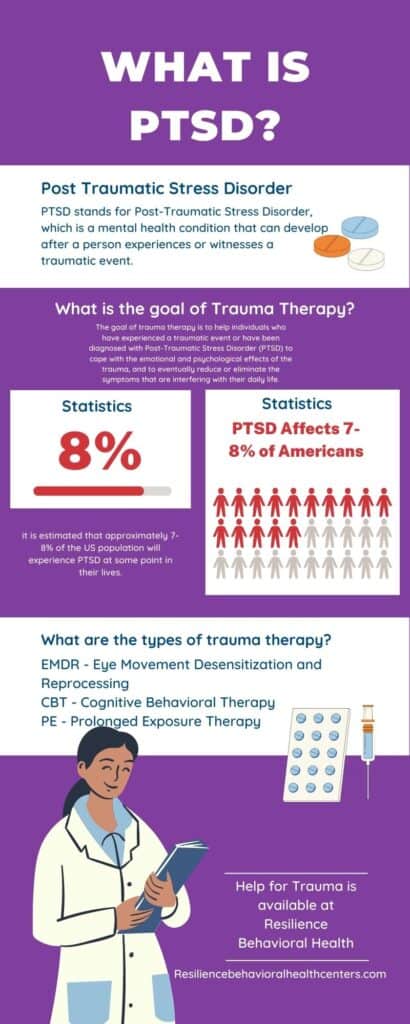Understanding the Benefits of EMDR Therapy in Massachusetts
“Trauma is a fact of life. It does not, however, have to be a life sentence“
Peter A. Levine
According to the National Council of Mental Wellbeing, around 223.4 million Americans have experienced a traumatic experience.
Trauma is a common experience that can affect anyone, regardless of age, gender, or background. Various events, such as accidents, violence, abuse, natural disasters, or war, can cause trauma. Trauma can have lasting effects on your mental health, such as anxiety, depression, post-traumatic stress disorder (PTSD), or other emotional and behavioral problems.
If you are struggling with the impact of trauma, you may feel stuck, hopeless, or overwhelmed. You may have difficulty coping with your emotions, memories, or relationships. You may also experience physical symptoms, such as headaches, insomnia, or chronic pain.
Fortunately, there is a way to heal from trauma and regain your sense of well-being. One of the most influential and evidence-based treatments for trauma is EMDR therapy. EMDR stands for Eye Movement Desensitization and Reprocessing. It is a type of psychotherapy that helps you process and unusually release traumatic memories — through your eye movements.
What Is EMDR Therapy, and How Does It Work?
EMDR therapy was developed by Dr. Francine Shapiro in 1987 to treat PTSD. It is based on the idea that when you experience a traumatic event, your brain gets stuck in a state of hyperarousal.
This means your brain is constantly alert, ready to fight or flee from danger. This can prevent you from healthy processing and integrating the event into your memory.
EMDR therapy helps you to reprocess the traumatic memory and change the way it is stored in your brain. It does this by using bilateral stimulation, which means alternately stimulating both sides of your brain. This can be done by moving your eyes from side to side, tapping your hands, or listening to sounds.
Bilateral stimulation helps your brain activate its natural healing mechanism and connect the traumatic memory with more positive and adaptive information. This can reduce the intensity and frequency of the negative emotions, thoughts, and sensations associated with the trauma.
Besides, it can help you gain new insights and perspectives on the event and yourself.
Eight Phases Of EMDR Therapy
EMDR therapy consists of eight phases, which include:
History taking and treatment planning
Your therapist will ask you about your background, current situation, and your goals for therapy. They will also explain the EMDR process and answer any questions.
Preparation
Your therapist will help you to establish a trusting relationship and develop coping skills to manage your emotions during and between sessions. They will also help you to identify a safe place in your mind that you can use to calm yourself if needed.
Assessment
Your therapist will help you to identify a specific traumatic memory that you want to work on. They will ask you to rate the level of distress you feel when you think of the memory, as well as the level of confidence you have in a positive belief about yourself related to the memory.
Desensitization
You will be guided to focus on the traumatic memory while using bilateral stimulation. They will check in with you periodically to see how you are feeling and what you are noticing. They will help you to process any emotions, thoughts, or sensations that come up until your level of distress decreases significantly.
Installation
Your therapist will help you strengthen and instill your optimistic beliefs about yourself related to the memory. They will use bilateral stimulation to help you associate the faith with the memory until your confidence level increases significantly.
Body scan
Your therapist will ask you to scan your body for any residual tension or discomfort related to the memory. They will use bilateral stimulation to help you release any physical sensations that you may feel until you are comfortable and relaxed.
Closure
Your therapist will help you to end the session positively and safely. They will review what you have accomplished and what you need to do to take care of yourself until the next session. They will also remind you of the coping skills you can use if you experience distress between sessions.
Re-evaluation
At the beginning of each session, your therapist will ask you to recall the memory you worked on and rate your level of distress and confidence again. They will also ask about any changes or new experiences since the last session. They will use this information to determine if you need to continue working on the same memory or move on to a new one.

What Are the Benefits of EMDR Therapy?
EMDR therapy has been proven to be effective in treating various types of trauma and related mental health issues, such as:
- PTSD
- Anxiety
- Depression
- Phobias
- Obsessive-compulsive disorder (OCD)
- Eating disorders
- Substance abuse
- Chronic pain
- Grief and loss
EMDR therapy can help you to achieve the following benefits:
Rapid Results
EMDR is often considered a more rapid form of therapy compared to traditional talk therapy for trauma. Some individuals may experience relief in a relatively short period, though the duration varies based on the individual and the nature of the trauma.
Reduced Emotional Distress
EMDR aims to desensitize emotional responses to traumatic memories, making them less distressing over time. This can lead to a reduction in symptoms such as anxiety, panic attacks, and nightmares.
Furthermore, EMDR helps individuals develop healthier coping mechanisms and strategies for dealing with stressors. This can enhance overall emotional resilience and well-being.
Cognitive Restructuring
The therapy involves the identification of negative beliefs related to the traumatic event. Through the EMDR process, these negative beliefs are targeted and reprocessed, promoting more positive and adaptive beliefs.
EMDR empowers clients to participate actively in their healing process. Clients identify target memories and guide the therapist through the EMDR procedures, fostering a sense of control and agency.
Bodily Sensations Integration
EMDR often involves paying attention to bodily sensations associated with traumatic memories. By integrating these sensations into the processing, individuals may better understand how their body responds to stress and trauma, leading to a holistic healing experience.
Interweaves for Processing Blocks
If a client experiences difficulty processing a particular memory or emotion during EMDR, therapists can use “interweaves.” These are therapeutic techniques that help clients navigate obstacles and move forward in the processing of challenging material.
Finding EMDR Therapy Massachusetts?
If you are interested in trying EMDR therapy, you may be wondering where you can find a qualified and experienced therapist in Massachusetts. One of the best ways to find an EMDR therapist is to use the Find an EMDR Therapist Directory provided by the EMDR International Association (EMDRIA).
Another way to find an EMDR therapist is to use the EMDR Therapists in Massachusetts page on Psychology Today. This comprehensive directory features profiles of therapists who offer EMDR therapy in Massachusetts.
Final Words
EMDR therapy is a powerful and innovative way to heal from trauma and improve your mental health. It can help you to reprocess and release the adverse effects of traumatic memories and enhance your positive beliefs and emotions. Moreover, it can help you cope better with your current challenges and achieve your personal goals.
If you are looking for EMDR therapy in Massachusetts, you have many options. You can use the online EMDRIA and Psychology Today directories to find a therapist who meets your needs and preferences. You can also contact the therapists to ask questions or schedule a consultation.
EMDR therapy can be a life-changing experience that can help you to overcome your past and to create a brighter future. If you are ready to take the first step, don’t hesitate to contact an EMDR therapist today. You deserve to heal and to thrive.


